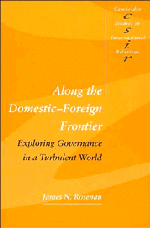Book contents
- Frontmatter
- Contents
- List of figures and tables
- Preface
- Acknowledgments
- Part I Intellectual contexts
- Part II Global contexts
- 4 Turbulence
- 5 Globalization
- 6 Fragmegration
- 7 Boundaries
- 8 Governance
- 9 Norms
- 10 Environments
- Part III Societal contexts
- Part IV Actors
- Part V Conclusions
- Epilogue
- Index
- CAMBRIDGE STUDIES IN INTERNATIONAL RELATIONS
9 - Norms
Published online by Cambridge University Press: 19 January 2010
- Frontmatter
- Contents
- List of figures and tables
- Preface
- Acknowledgments
- Part I Intellectual contexts
- Part II Global contexts
- 4 Turbulence
- 5 Globalization
- 6 Fragmegration
- 7 Boundaries
- 8 Governance
- 9 Norms
- 10 Environments
- Part III Societal contexts
- Part IV Actors
- Part V Conclusions
- Epilogue
- Index
- CAMBRIDGE STUDIES IN INTERNATIONAL RELATIONS
Summary
The society is caught between values. The old ones are gone, and the new ones are not yet formed.
Lt. Roman G. FyodorovAs the Frontier widens, so do traditional norms become less applicable to the new fragmegrative situations. Confronted with unfamiliar issues, new claims to loyalty, and a multiplicity of messages received from ever greater numbers of disparate sources, both citizens and officials are likely to feel deprived of the normative anchors to which they have long been accustomed. Systems of rule cannot persist unless they enjoy the support of most of those they encompass, and underlying the support for particular goals and specific policies are norms about the processes of governance to which people subscribe. If such norms are widely shared, governance is undertaken relatively easily; but if there is considerable division over who is entitled to make policy decisions, what constitutes the legitimate procedures for making policy, and whether the regulations that flow from the adopted policies are to be obeyed, then governance becomes very difficult indeed. Thus it is that many forms of governance at the local and national levels have enabled organizations, communities, and societies to preserve their coherence and move toward their goals. It is the extent to which the same can be said about governance along the Frontier that is the prime focus of this chapter.
- Type
- Chapter
- Information
- Along the Domestic-Foreign FrontierExploring Governance in a Turbulent World, pp. 174 - 188Publisher: Cambridge University PressPrint publication year: 1997

